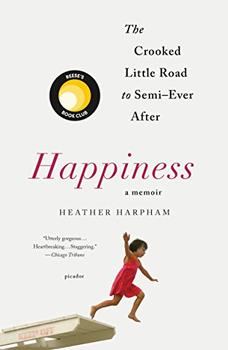Summary | Excerpt | Reading Guide | Reviews | Beyond the Book | Readalikes | Genres & Themes | Author Bio

The Crooked Little Road to Semi-Ever After
by Heather Harpham
My mother's car was trailing the ambulance. I knew she was filled with worry. Worry was undeniably called for given the situation: ambulance, dawn, newborn, bad blood. But the baby sleeping peacefully under my hand defied worry. She had a rosebud mouth and delicately veined eyelids. She didn't stir, not even when the driver turned on the siren to speed through red lights. I stroked her forehead and tried to get my mind around our situation. Inside this tiny person, microscopic red blood cells were falling apart. She was a stressed creature, straining to deliver sufficient oxygen to the outposts of her body. How could she appear so serene?
The repertoire of reptilian brain function—fight, flight, denial, play dead—is great for emergencies. It wedges space between the event and the self. I had been swinging between denial and fight (my two personal favorites) from the moment the round-faced doctor said ambulance. Now, sitting with the baby, I felt the unwelcome return of higher reasoning. I began to pump the paramedics for information: What would happen when we arrived at the hospital? Would I be allowed to stay with the baby? How long would it take to clean her blood? What were the odds for babies in this situation?
One of them explained that the method for cleaning her blood was called an exchange transfusion. An exchange transfusion works, she said, by removing all the blood from the body, passing it through a device that extracts excess iron, warming the blood back up, and returning it to circulation.
Are you insane? I wanted to ask. Bloodletting? So clichéé. So over. So Middle Ages. Consider your reputation, if not the baby.
I sat there in silence, trying to visualize what a blood cleaning/warming machine might look like and how they would attach it to her. It dawned on me that the next few hours mattered, really mattered, and that even babies who smelled just right might drift off.
I looked down at my girl, sleeping, gathering air, converting it into oxygen.
"All the blood? Out of her body? At the same time? " I asked. "Is that prudent?"
The paramedic touched my shoulder and said, "She'll be OK. They're much stronger than they look."
Through the small window at back of the ambulance, I could see a steady streak of green. My mom's Volvo sedan, behind us. I had the sense that she would follow us anywhere, no matter how fast, no matter how far. When I had called my mom, only an hour ago, she'd been asleep. "What do you mean rusty blood?" she'd said. "Is this about the baby?"
"Drive here," I'd said. "We need you."
She'd arrived in time to catch the ambulance's wake. For her, I was the girl, and this whole ambulance was the plastic box.
***
After our third date, we went back to his apartment. He was a studio dweller on the Upper West Side, twenty-sixth floor, a view of the George Washington Bridge, which he revered. A wall of windows and little else. He had a single pot and stacks of books. Against the barrenness, he'd waged the smallest possible stand—a decorative postage stamp. Joe Louis.
That is how I began to fall in love with Brian, all that emptiness, and then, suddenly, a black-and-white postcard of Paris or Beckett; the hidden trapdoor to something more.
The art in my apartment was as big as I could afford it to be, giant posters from foreign museums, hand-carried on the plane ride home, trying always not to dent them, destined for cheap oversized Ikea frames. My favorite was by the Mexican painter Rufino Tamayo; it showed a figure, sitting facedown at a table, the circumference of his head dominating the space in pinks, yellows, violets. Man Radiating Happiness.
In contrast to Brian's, my daily life was erratic, unorganized, and subject to an appetite for salty snacks, phone chats, trashy magazines, generalized rose-sniffing. My mornings were spent teaching drama in public schools with kids all over the city as an "actor-teacher" with the Creative Arts Team at NYU. Afternoons, when I should have been doing my own schoolwork (I was a grad student) or rehearsing a new solo piece, I would instead lollygag about town. If I did rush home, it was to watch General Hospital and eat ice cream. If a friend called to say let's go to Battery Park and check out the river, I was game. Even if I had a pile of more pressing things. Around 11 p.m., when the hourly studio rates fell, I would go rehearse. If I had a performance coming, I'd focus. Otherwise, I was a creative malingerer.
Excerpted from Happiness by Heather Harpham. Copyright © 2017 by Heather Harpham. Excerpted by permission of Henry Holt and Company. All rights reserved. No part of this excerpt may be reproduced or reprinted without permission in writing from the publisher.
Your guide toexceptional books
BookBrowse seeks out and recommends the best in contemporary fiction and nonfiction—books that not only engage and entertain but also deepen our understanding of ourselves and the world around us.